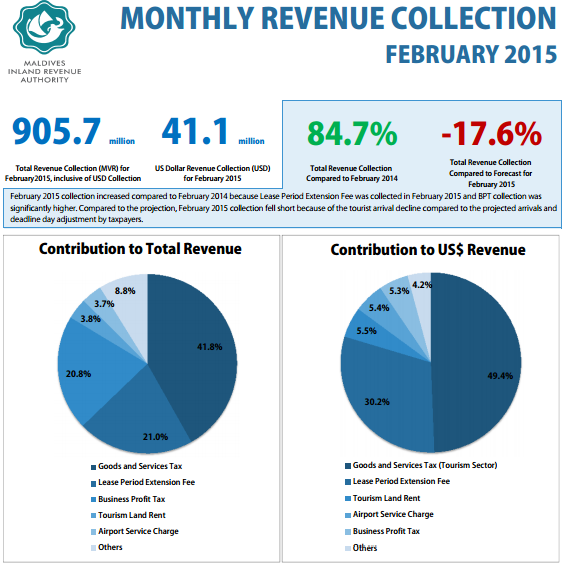The Maldives has significantly underestimated the value of tourism to the local economy by over a billion dollars, according to a report by economics lecturer and Assistant Manger of the Maldives Monetary Authority (MMA)’s Monetary policy and Research Division, Ibrahim Ameer.
In the first month following the introduction of 3.5 percent Tourism Goods and Services Tax on the tourism sector, the Maldives Inland Revenue Authority (MIRA) collected US$7.2 million from 800 of the 871 registered tax payers.
“This means the whole tourism industry’s revenue (market value) would amount to approximately US$210.0 million for the month of January and approximately US$2.5 billion for the whole year,” observes Ameer.
In comparison, the government’s official figure for the total market value of all goods and services produced in the country – not just tourism – is US$1.5 billion.
In his report, Ameer recalculates the budget deficit based on updated GDP figures and concludes that the deficit sits at nine percent, “as opposed to 17 percent of GDP in 2010 as per government authorities.”
“I suspect these underestimated figures are used by the authorities to prolong the preferential treatment Maldives has and in some cases continues to receive as a [former] Least Developed Country (LDC),” Ameer surmises, suggesting that “ our country’s problems are primarily a case of the state’s inability to collect revenue through taxation rather than a budget deficit.”
“It should be agreed that as the country marches towards full democratization, with new independent statutory institutions, local and atoll councils and increased civil service salaries, the country needs to rethink it tax policy,” Ameer states.
In an agreement reached with the International Monetary Fund (IMF) last week, the Maldives has committed to:
- Raise import duties on pork, tobacco, alcohol and plastic products by August 2011 (requires Majlis approval);
- Introduce a general goods and services tax (GST) of 5 percent applicable to all sectors other than tourism, electricity, health and water (requires Majlis approval);
- Raise the Tourism Goods and Services Tax (TGST) from 3.5 percent to 6 percent from January 2012, and to 10 percent in January 2013 (requires Majlis approval);
- Pass an income tax bill in the Majlis by no later than January 2012;
- Ensure existing bed tax of US$8 dollars a night remains until end of 2013;
- Reduce import duties on certain products from January 2011;
- Freeze public sector wages and allowances until end of 2012;
- Lower capital spending by 5 percent
Comparison figures Ameer provides for corporate, income and GST/VAT tax regimes regionally and around the world, show the proposed figures for the Maldives are substantially lower.
India, for example, has a 25 percent business profit tax (BPT), individual income taxes of 0-30 percent, and a GST of up to 12.5 percent. Pakistan has a 35 percent BPT, 7.5-35 percent income tax and a GST of 17 percent. Barbados, another tropical island tourism destination, collects a BPT of 25 percent, income tax of 25-25 percent and a GST of 15 percent.
In his conclusion, Ameer argues against substantial cuts of the Rf12 billion state budget, noting the impossibility of reducing that to match the government’s present RF7 billion in revenue, and presses for the careful introduction of taxation.
“We could save some expenditure through cutting waste, prioritising projects and eliminating corruption. On the other hand, we must all agree that in certain areas wage and salaries given are very low compared to many countries,” he suggests.
As a result, “it is difficult to retain skilled and highly educated people in the country. This is why we see so many bright Maldivians leaving the country to work abroad. In the education sector, where the future of the country is molded and where the bright and the best are needed to teach future generations, the remuneration is pathetically low. The average wage for leading teacher with a Master’s degree is Rf 8354 (US$540).”
“The academic and education sector should be highly competitive and more rewarding if we are to build a better future and save ourselves from the sort of ‘brain-drain’ that we cannot afford. The situation is more or less the same with the healthcare sector of this country, with many of the brightest doctors and nurses opting for work abroad in countries as diverse as New Zealand and Canada,” Ameer observes.
He notes that the disproportionately high rents in Male’ swallowed 70-80 percent of the income of many residents in the city, “and as a result, disposable income is lower than it should be to encourage a more competitive market place and economy.”
“Because only Male’ is equipped with all the necessary facilities, like education and health care, more than one third of the population is living here. This creates irreparable social and economic damage,” Ameer claims.
Much of the visible development in Male’ he claims is the a result of a “coffee-shop bubble, a smokescreen that is bound to burst dragging the economy into depression.”
“To achieve sustainable development we need to see past supermarkets, boutiques and coffee shops in every corner,” he suggests.
“The wealthy need to realize that it is more lucrative to have businesses that decline, over our dependence on imports. The present business model increases imports and puts more pressure on the foreign exchange. It only widens the disparity between the rich and the poor when there is a negative impact on the economy.”
Read the full report
Likes (0)Dislikes
(0)Dislikes (0)
(0) 